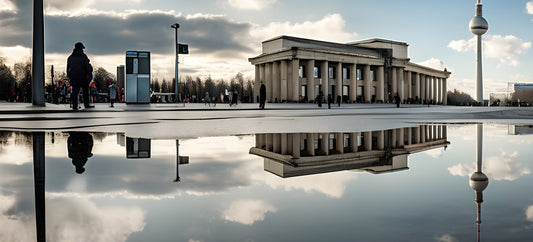Antje, with your new book on the music history of Meiningen you close a gap. What is special about Meiningen's musical past that you want to commemorate with this book?
The southern Thuringian city of Meiningen was for centuries a central German music center, comparable to Weimar or Leipzig. Members of the Bach family worked here, as did the composers Johannes Brahms, Richard Strauss and Max Reger, whose scores are on site in the Reger archive. The court orchestra and theater had a pan-European appeal.

How do you explain the attraction that Meiningen has had on musicians, conductors and composers across Europe over the centuries?
Meiningen was the residence of the Duchy of Saxony-Meiningen. The members of the house have proven to be extremely artistic over the generations. As a small state, Meiningen compensated for its political insignificance by placing a high value on education and culture, which also included the maintenance of the theater and court orchestra. This brought prestige, but was cheaper than building a large army. The Dukes of Meiningen preferred to finance musicians rather than soldiers.
Can one say that the enthusiasm for music was “passed on” within the Meiningen court?
The Dukes of Meiningen placed great value on the excellent upbringing and training of their offspring. They were often artistically active themselves. In the early 18th century, Duke Ernst Ludwig, who wrote poetry and hymns, held the scepter in his hand.
The fact that Meiningen made a name for itself as a cultural center across Europe at the end of the 19th century is largely thanks to Duke George II of Saxony-Meinigen, the “Duke of Theater”. He was also highly educated. In his youth, he not only completed the military training required for the nobility, but also studied history, law, economics and art history in Bonn and Leipzig.
How did Duke George II of Saxe-Meinigen shape his small duchy?
During his long reign between 1866 and 1914, there was an intellectually stimulating atmosphere at the Meiningen court, freed from rigid etiquette. Georg himself dabbled as a painter and pianist. He intensively promoted his theater and orchestra and invited composers such as Richard Wagner, Franz Liszt and Edvard Grieg. He made Meiningen a model liberal state, pursued a clever economic and social policy, and ran a proper administration.
What was your personal motivation for dealing with the topic? What relationships do you maintain with Meiningen?
My maternal ancestors come from Meiningen. As a child, I spent many wonderful weeks with my grandparents in the nearby Rhön. My grandfather from Meiningen, a gifted piano player and Beethoven connoisseur, settled here as a master baker and confectioner. We regularly visited his sister in Meiningen, who lived in Schöne Aussicht under the roof of an old villa. You really had a wonderful view of the old town.
I continue to take part in Meiningen's cultural life by writing for the features section of the Thuringian regional newspaper Freies Wort.
Her book will be published in time for the 2024 tourism theme year “Thuringian Castles and their Stories”. How does your book enrich this campaign?
Of course, Meiningen's magnificent baroque castle, the Elisabethenburg, the former residential palace, plays an important role in the theme year. Concerts have always taken place here. Today the castle is part of the Meiningen museums. The exhibition “Meiningen – Court of Muses between Weimar and Bayreuth” is running in the former living quarters of Duke George II, which offers a clear insight into Meiningen’s music history.

Can we assume that the “Miracle of Meiningen” has a future?
The decline in audience after Corona and financial bottlenecks pose challenges for many theaters and museums. However, Meiningen can benefit from the fact that it has already overcome a serious crisis. In the 1990s, numerous theaters and orchestras in the former GDR were liquidated or merged. The Meiningen Theater escaped this fate and was even able to attract international attention. It was then that the saying “Miracle of Meiningen” arose.
In addition, the citizens play a crucial role in this miracle. Music and theater are the talk of the town in Meiningen. Everyone in town knows someone who plays in the orchestra, sings in the choir or makes costumes. Everyone is somehow connected to the theater. The “Miracle of Meiningen” is not an invention of the features section. But something like this cannot be taken for granted; it must be nurtured and nurtured - through civic engagement, but also through political commitment.
The interview was conducted by Christian Leeck. Machine translated from German.
Wuppertal, September 2023




